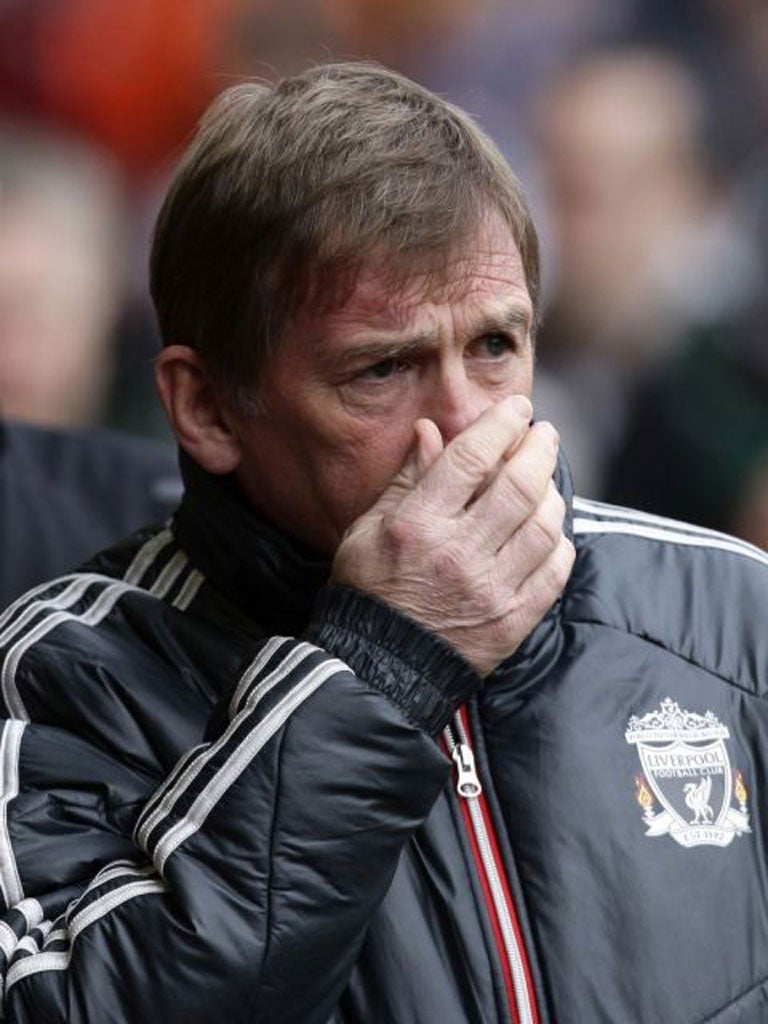Tim Rich: When it comes to paranoia, Kenny's the undisputed king
Instead of railing against perceived vendettas and conspiracy theories, Dalglish should concentrate on Liverpool's home form

When it comes to conspiracy theories, Kenny Dalglish lags a long way behind Sir Alex Ferguson, whose obsession with the Kennedy assassination led him to obtain a copy of the autopsy report.
In one of their first meetings, in days of Liverpool's unbroken dominance, Dalglish once passed Ferguson raging into a radio microphone about the impossibility of getting a decision at Anfield. He was holding his daughter, Lauren, and told the interviewer the baby would make more sense.
In the past, managers who came to Anfield used to suffer from paranoia; now it is the man in the home dugout who talks of refereeing decisions gone wrong and vendettas against his players. If referees tend to give big decisions to big clubs on their own pitches – a theory that seemed proven at Stamford Bridge on Saturday and Old Trafford yesterday – then Liverpool are no longer a big club.
Luis Suarez had been booked for diving when, in Dalglish's words, he was lucky not have had his foot broken by Stephen Ireland. The referee, Michael Oliver, had told Dirk Kuyt that Eric Lichaj had been "unlucky" to have handled in the area. Dalglish argued that he wanted to retain Liverpool's integrity while adding: "Maybe we should shoot our mouths off."
Liverpool have been unlucky a lot this season. They had struck the frame of the goal 23 times before Saturday's encounter with Aston Villa at Anfield and did so another four times during a tormented afternoon. They have been awarded fewer penalties than Wigan and half as many as Manchester United. And they have missed most of those they have been given.
Of the last 10 shots aimed at Liverpool's goal, eight have gone in. Nearly half the goalscoring opportunities Liverpool have given their opponents have finished with the ball in their net. You could call it unlucky or you might think Liverpool have a back four that requires a serious overhaul – it is the one area of the squad Dalglish has barely touched.
Liverpool, in contrast, have not converted even a third of their chances. According to websites that study these things, the average chance conversion rate is 38 per cent.
You can tell a lot from the banners on the Kop and amid the homages to "Sir" Roger Hunt and Billy Liddell there was one that read: "Support and Believe." There is still plenty of support for Dalglish, although belief is a commodity seriously on the wane.
The greatest source of belief at Liverpool is that whatever Dalglish does, it has to be an improvement on his predecessor.
There are not many things that were better in Roy Hodgson's short tortured time on Merseyside but under him Liverpool did win six of their 10 matches at Anfield. This season, Dalglish, a man who is idolised rather than treated with indifferent contempt by the Kop – which was Hodgson's lot – has overseen just five home victories in 16 attempts. That is not unlucky, that is awful.
Before the game, Dalglish defended his habitual policy of never criticising his players in public, which sometimes makes his utterances sound like a press officer from the North Korean FA. When he does, it is in private and it is calculating and effective.
After Liverpool lost the 1990 FA Cup semi-final to Crystal Palace 4-3, Dalglish gave his press interviews, showered and changed and waited 15 minutes before turning on his players and accusing them of delivering "the most unprofessional performance I have ever seen". Steve McMahon was the chief target but nobody was exempt.
He did the same after the 3-1 defeat at Bolton in January. In 1990, his players responded by cementing the championship; now they knocked both Manchester clubs out of the Carling and FA Cups.
When he returned in January last year, some said that Liverpool had to get Dalglish out of their system just as Kevin Keegan's abortive comeback at St James' Park had meant he was no longer seen as a great lost leader.
Dalglish has not failed but he has not transformed Liverpool. The worst possible outcome for those plotting the long-term future of the club is that Dalglish would prove moderately successful.
Everything now pivots around Saturday's FA Cup semi-final against Everton. Should Liverpool win, it would give Dalglish a loincloth rather than a fig leaf for the season. Two major finals, by any reckoning is a good season, two trophies a triumphant one.
Marcelo Bielsa's lionised boys from Athletic Bilbao are on course for two cups and they are even more bogged down in La Liga's mid-table mire than Liverpool are in theirs.
Silverware matters and given the fact that "Europe" is no longer the exotic destination it appeared a few years ago, but an exhausting money-making merry-go-round, it matters more than ever. Ask Robin van Persie. Ask Cesc Fabregas.
27: Hitting the bar
Liverpool had struck the frame of the goal 23 times this season before the Aston Villa game – they then managed to hit the post and crossbar four more times on Saturday.
Join our commenting forum
Join thought-provoking conversations, follow other Independent readers and see their replies
Comments
Bookmark popover
Removed from bookmarks